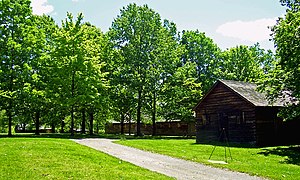
Back Conspiració de Newburgh Catalan Newburgh-Verschwörung German Conspiration de Newburgh French Cospirazione di Newburgh Italian Ньюбургский заговор Russian Nyuburg fitnasi Uzbek

The Newburgh Conspiracy was a failed apparent threat by leaders of the Continental Army in March 1783, at the end of the American Revolutionary War. The Army's commander, George Washington, successfully calmed the soldiers and helped secure back pay. The conspiracy may have been instigated by members in the Congress of the Confederation, which circulated an anonymous letter in the army camp at Newburgh, New York, on March 10, 1783. Soldiers were unhappy that they had not been paid for some time and that pensions that had been promised remained unfunded.
The letter suggested that they should take unspecified action against Congress to resolve the issue. The letter was said to have been written by Major John Armstrong, aide to General Horatio Gates, although the authorship and underlying ideas are subjects of historical debate. Commander-in-Chief George Washington stopped any serious talk of rebellion when he made an emotional address to his officers asking them to support the supremacy of Congress. Not long afterward, Congress approved a compromise agreement that it had previously rejected: it funded some of the pay arrears, and granted soldiers five years of full pay instead of a lifetime pension of half pay.
The motivations of numerous actors in these events are debated. Most historians say that the plot was led by civilians. Their goal was forcing Congress to make good on its long-standing promises to the soldiers. Some historians allege that serious consideration was given within the army to some sort of coup d'état, while others dispute the notion. The exact motivations of congressmen involved in communications with army officers implicated in the events are similarly debated.